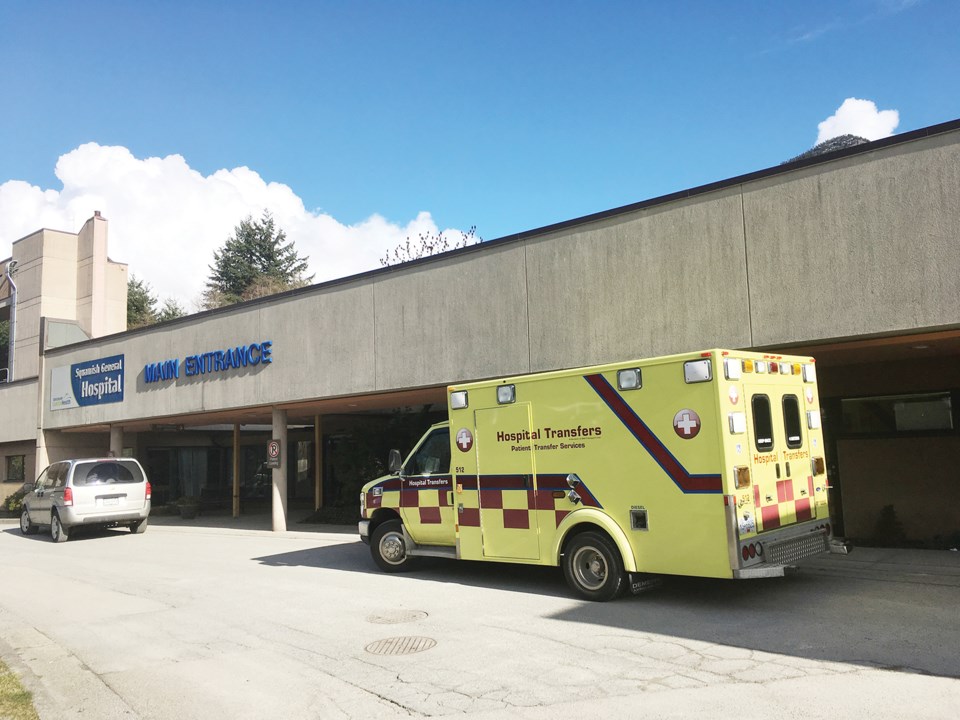Tyne Sowerby has watched many friends desperately battle mental illness in the Sea to Sky Corridor.
A social service worker, Sowerby told The Chief the situation is made worse by the fact there isn’t a safe place to go to get immediate mental health help in the region. Squamish General Hospital doesn’t have a psychiatric ward or mental health beds.
Ideally, Sowerby would like to see a stand-alone mental health facility set up in the corridor but, failing that, she said Squamish Hospital should at least be equipped with psychiatric beds.
“I became involved in this career because of an inability to help my friends and family. I assumed if I had a diploma I could be a bit more of an aid,” she said.
“I’ve had four individuals who I considered great friends pass away in the last five years. I’ve known another handful disappear into the world of addiction and mental illness. All of this I blame on the small town corridor’s lack of support.”
A spokesperson for Vancouver Coastal Health – the authority responsible for health care services in the Sea to Sky Corridor – said that when mental health funding comes in, it goes toward providing services within the community.
People in acute mental health distress will be transported from the Squamish emergency department to Lions Gate Hospital, the spokesperson confirmed.
If the issue is not acute, emergency room doctors can help the patient access a treatment team that includes two psychiatrists in Squamish, the spokesperson said.
Squamish Helping Hands Society currently provides noncritical mental health and substance-use beds for Vancouver Coastal Health through its Home InStead program.
“These beds were and are needed but in order to fill out the continuum of care required to serve our community responsibly we need mental health beds in hospital,” said Maureen Mackell, executive director of Helping Hands.
“We see the need for this on a regular basis. When our clients are in crisis, there are few options available outside of being shipped down to Lions Gate.”
Having mental health beds in Squamish would likely save lives and reduce costs, Mackell added.
“In the last few years we have lost many from our vulnerable community where mental health was certainly a key issue affecting their wellbeing. Having mental health beds available is critical in providing the care our citizens deserve.”
Fifteen Squamish residents who were suffering with mental health issues were transported by police officers to the hospital in 2016, according to the Squamish RCMP.
Mayor Patricia Heintzman, who is also chair of the Sea to Sky Regional Hospital District board, has long advocated for mental health beds in the corridor and for awhile they were on the health authority’s agenda too, she said.
“When I first got on the board, back in 2008… we had a series of four priorities we were working on and… the forth one was mental health beds at the Squamish General Hospital,” she said.
“There’s no safe place – whether you are youth or adult – for not only staff and patients but for the general public at the hospital…”
Documents for the Sea to Sky Regional Hospital District show the beds were actually on the Vancouver Coastal Health minor facilities budget for 2011, but then do not appear again in 2012.
Asked about the drop in funding in the documents, the spokesperson for the health authority said the issue does come up, but added that there isn’t currently a staffing model that can support mental health beds at Squamish Hospital, but she said Vancouver Coastal Health is always open to reviewing how it provides care.
Heintzman said under the memorandum of understanding with the health authority, the board will fund up to 40 per cent of a project for the Squamish Hospital.
“We want to talk about priorities that are real in the region,” she said.
A lack of mental health beds is not an issue unique to Squamish.
Globally, the median is 1.4 beds in general hospitals per 100,000 people, according to the 2011 Mental Health Atlas.
Across the province, the number of beds for people in emergency psychiatric crisis has fallen over the years, according to stats from the Canadian Institute for Health Information.
In 2015 there were 1,219 beds in B.C. or 26 beds for every 100,000 people. That is down from 1,305 beds or 30 spots for every 100,000 individuals in the province in 2007.
Some places are doing much better than we are at carrying for our mentally ill. The Netherlands has 137 mental health beds per 100,000 people, while in the U.S. there are 34 beds per 100,000, according to the World Health Organization.
Squamish counsellor Jade Honce works with children, youth and adults and specializes in working with people who have experienced trauma.
“We live in a world where mental health issues are a big issue,” she said. “A lot of people experience trauma and suicidal ideation is a lot more common than we think.”
“It is unfortunate that our smaller towns outside the big cities just don’t have the same resources,” she said. “It is just a fact of life so what I always think is that we have to be better at prevention.”
She advises anyone concerned about a loved one’s mental health to get training to know the signs someone is contemplating suicide, for example. She also wishes more parents felt comfortable talking about mental health struggles.
“The more comfortable we are talking about it maybe the more real connection and support we can give,” she said.




